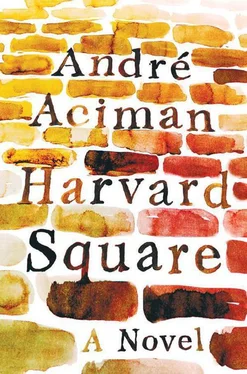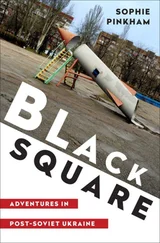One day, as I walked into Café Algiers, I noticed a girl reading a book at what was my usual corner table. The table next to hers was unoccupied. So I walked over to the free table, put my book down, and sat down. She was reading Melville. I was rereading Spenser. When eventually she lifted her head, I caught her gaze and asked where she was in Moby-Dick . She told me. I made a face. She smiled. She looked over at my book and said she’d studied Spenser the previous year. The two of us were reading impossible English, I ventured. “It just takes getting used to,” she said sweetly. We continued to talk. About the teachers, about our books, about other books. She liked many authors. I wasn’t so sure I liked so many. Then, with the conversation drying up, I let her go back to her reading, and I picked up mine. Not long afterward, she stood up, left some change on the table, and was about to leave the café. “Maybe you should reread Melville,” she said before walking out.
“Maybe,” I said.
I felt I had made an enemy.
“Couldn’t you tell she wanted to keep talking?” Kalaj said when he walked up to my table. I hadn’t noticed he’d been watching me all this time. He asked what we’d spoken about.
“So you spoke about books. Then what?”
I didn’t know that there was a then what .
“You could have said something about her, or at least said something about yourself. Or the people around us. Or tea leaves, for the love of God. Anything! You could have asked questions. Helped her answer them. Suggested things. Made her laugh. Instead you told her you hated things. You’re a champion — seriously.”
“It’s where the conversation went.”
“Because you let it go there.”
“Because I let it go there.”
“Exactly.”
“What will you do the next time you speak to a woman in a café?”
My silence said it all.
“Do you not understand women or are you just inept?”
I looked at him in dismay.
“I suppose both,” I finally said.
The two of us burst out laughing.
He knew the whereabouts of everyone, understood why and how things worked, trusted no one, and at all times expected the worst from each and every one. He foresaw what people might do or say, figured things out even when he couldn’t understand the first thing about them, and sniffed out deceit and shortcuts most mortals were simply unaware even existed. In this, as in so many other things, he belonged to another order of beings. Gods, heroes, and monsters hadn’t been invented when he burst in on the fifth day of creation all wired up and set to go. Mankind would arrive much, much later.
Kalaj also remembered faces. While walking with him one day I ran into a Syrian fellow I knew and said, “He’s a good guy.” “He’s a sick fuck,” Kalaj replied, and right away related how, a few weeks earlier, he’d seen this exact same man argue with his girlfriend and slap her across the face outside a nightclub in downtown Boston. “Actually, of all the people I know here, he is the only one I fear. He could stab you in cold blood, bugger you afterward, then run you over with his car. I’ll bet you anything he’s a spy.”
I didn’t believe Kalaj at the time, but years later, I heard that this same man, after disappearing in the Massachusetts penitentiary system for assault, rape, and battery, resurfaced as a book dealer in the West.
Kalaj had another gift. He not only remembered faces, he saw through them as well. Your friend So-and-so, I don’t trust him. Your other friend Such-and-such, he hates you . The list was endless. So-and-so always sits sideways so as never to look you in the eye. Such-and-such seems kind, but only because she’s scared to tell you she dislikes anyone. As for this guy over there, he is not intelligent, just crafty. She is not happy, just laughs a lot. She is not passionate, just restless. He is not wise, just bitter. Hysterical laughter means nothing — like bar chatter, like telephone intimacies, like saying I love you instead of a plain goodbye. He hated people who said I love you before hanging up. It meant they didn’t. He mistrusted people who cried easily at the cinema. It meant they felt nothing in real life. So-and-so always affects to be giddy, but it’s only to avoid telling you the truth. So-and-so says he has a great sense of humor. But he never laughs. It’s like saying one’s aroused without getting hard.
So-and-so this, So-and-so that. Rat-tat-tat-tat, rat-tat-tat-tat.
Did I want to know why Young Hemingway has a beard? he once asked.
Why?
To hide he has no chin.
Did I know why So-and-so covers her mouth when she laughs?
Why?
To hide her big gums.
Did I know why people say So-and-so is smart?
Because everyone else says it.
Did I want to know why So-and-so complains that things are so expensive?
Because his father is wealthy and he doesn’t want you to think he’s a daddy’s boy.
Did I know why he claims he should stop buying expensive clothes?
Because he wants you to know he was born with a taste for them.
On and on and on.
He measured everyone on a Richter scale of either passion or authenticity, usually both, because one invariably implied the other. No one passed. His universe thronged with people who were never who they claimed to be. Where had he learned to think this way? Was any of it real? Or was it all arrant nonsense spewed out of a private Aladdin’s lamp fanned by nightmares and demented demons? Or was this just one very unlucky man’s way of staying afloat in a New World he couldn’t begin to fathom except by thinking he was onto all of its mean and cozy little tricks, that he could read the face behind the mask, that he knew which way the world turned because it had turned on him so many times?
In the end, all he was left with was guesswork and rapid-fire Third-World bluster and paranoia — the perfect cross between desert seer and street hustler.
“Did you notice how you always cross the street on the slant?” he asked me one day.
“Because it’s the shortest distance,” I replied, thinking hypotenuse.
“Yes, but that’s not why you do it.”
I had never considered this before and tried to give it no thought. But I knew he’d seen right through me: I did things on the sly, I was born oblique — read: disloyal.
I pretended not to hear.
He probably saw through this as well.
I was shifty, he was up-front. I never raised my voice; he was the loudest man on Harvard Square. I was cramped, cautious, diffident; he was reckless and brutal, a tinder box. He spoke his mind. Mine was a vault. He was in-your-face; I waited till your back was turned. He stood for nothing, took no prisoners, lambasted everyone. I tolerated everybody without loving a single one. He wore love on his sleeve; mine was buried layers deep, and even then… He was new to the States but had managed to speak to almost everyone in Cambridge; I’d been a graduate student for four years at Harvard but went entire days that summer without a soul to turn to. When he was upset or bored, he bristled, fidgeted, then he exploded; I was the picture of composure. He was absolute in all things; compromise was my name. Once he started there was no stopping him, whereas the slightest blush would stop me in my tracks. He could dump you and never think twice of it; I’d make up in no time, then spite you forever after. He could be cruel. I was seldom kind. Neither of us had any money, but there were days when I was far, far poorer than he. For him there was no shame in poverty; he had come from it. For me, shame had deep pockets, deeper even than identity itself, because it could take your life, your soul and bore its way in and turn you inside out like an old sock and expose you for who you’d finally turned into till you had nothing to show for yourself and couldn’t stand a thing about yourself and made up for it by scorning everyone else. He was proud to know me, while, outside of our tiny café society, I never wanted to be seen with him. He was a cabdriver, I was Ivy League. He was an Arab, I was a Jew. Otherwise we could have swapped roles in a second.
Читать дальше












